Advanced Management Accounting Report: Factors & Stakeholders
VerifiedAdded on 2022/11/14
|10
|2377
|67
Report
AI Summary
This report delves into advanced management accounting, exploring the purpose and presentation of financial data from the perspective of various stakeholders. It examines the significance of financial data for stakeholders, including suppliers, creditors, media, consumers, the public, and government, as well as internal stakeholders like shareholders, employees, and managers. The report further evaluates the impact of changing external and internal factors on management accounting practices. Internal factors such as organizational structure, size, strategy, and business line are discussed, along with external factors like environmental uncertainty and market competition. The analysis highlights how these factors influence the adoption of management accounting practices, emphasizing the need for adaptation to maintain competitiveness and achieve favorable outcomes. The report references several academic sources to support its findings.
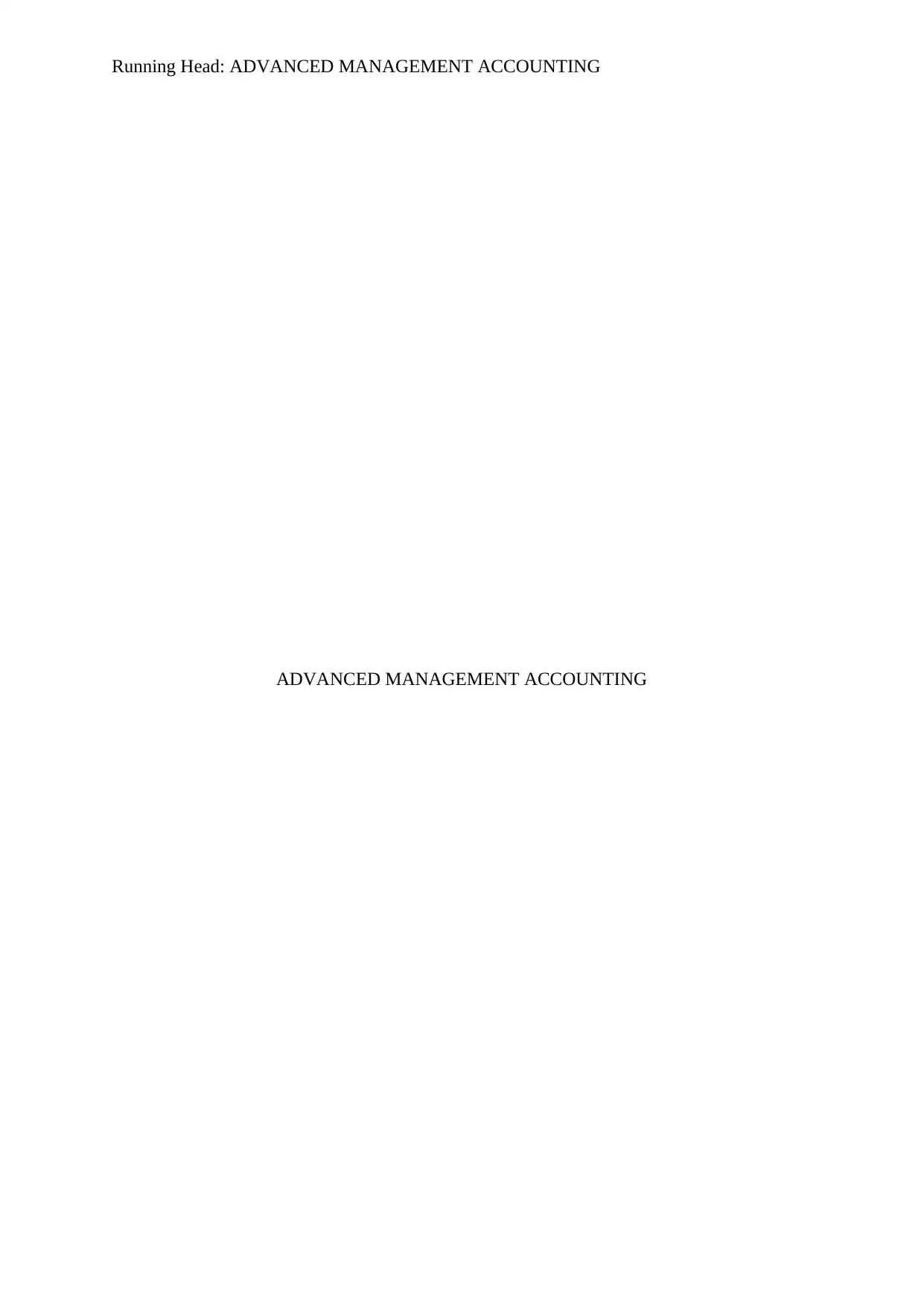
Running Head: ADVANCED MANAGEMENT ACCOUNTING
ADVANCED MANAGEMENT ACCOUNTING
ADVANCED MANAGEMENT ACCOUNTING
Paraphrase This Document
Need a fresh take? Get an instant paraphrase of this document with our AI Paraphraser
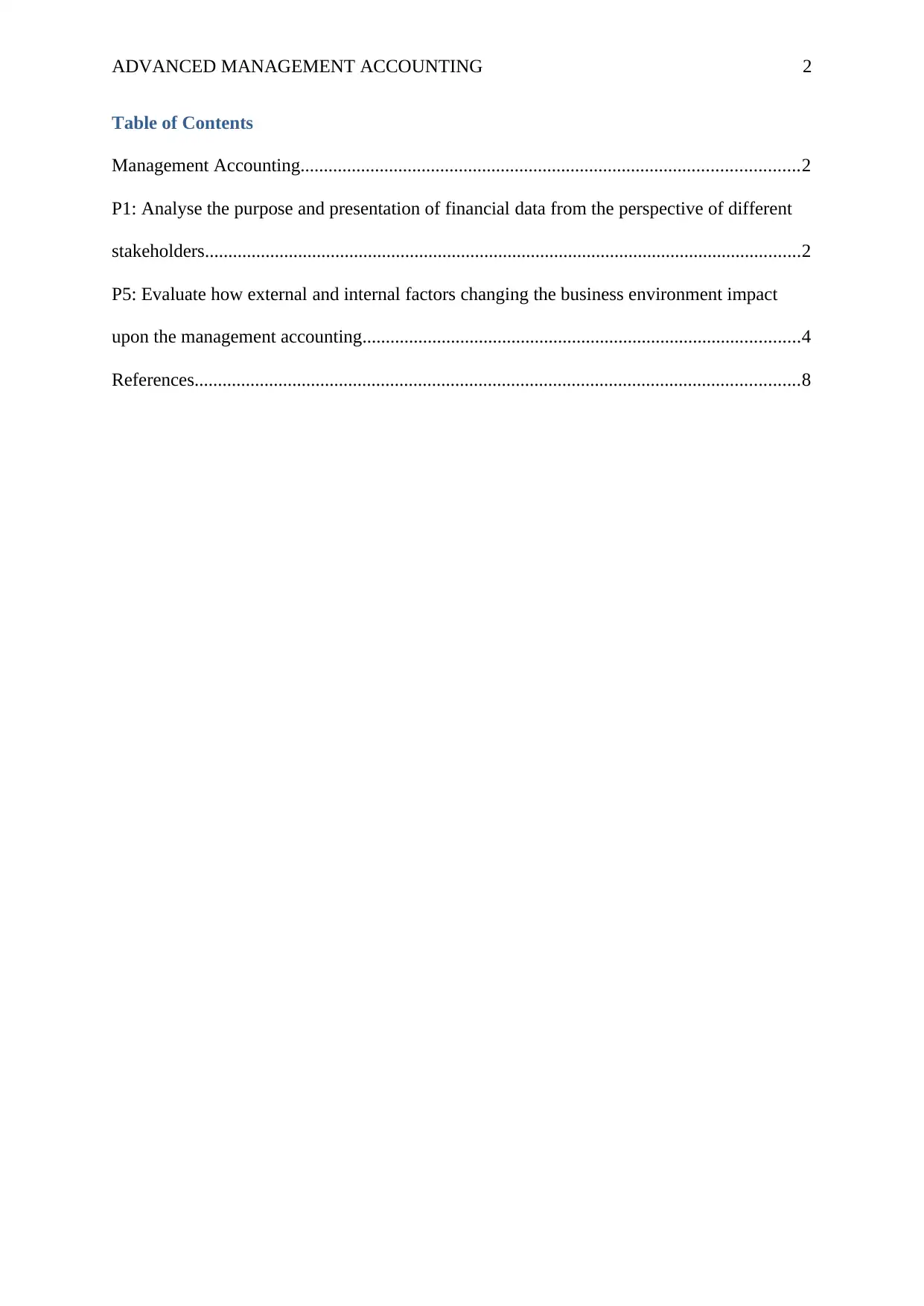
ADVANCED MANAGEMENT ACCOUNTING 2
Table of Contents
Management Accounting...........................................................................................................2
P1: Analyse the purpose and presentation of financial data from the perspective of different
stakeholders................................................................................................................................2
P5: Evaluate how external and internal factors changing the business environment impact
upon the management accounting..............................................................................................4
References..................................................................................................................................8
Table of Contents
Management Accounting...........................................................................................................2
P1: Analyse the purpose and presentation of financial data from the perspective of different
stakeholders................................................................................................................................2
P5: Evaluate how external and internal factors changing the business environment impact
upon the management accounting..............................................................................................4
References..................................................................................................................................8
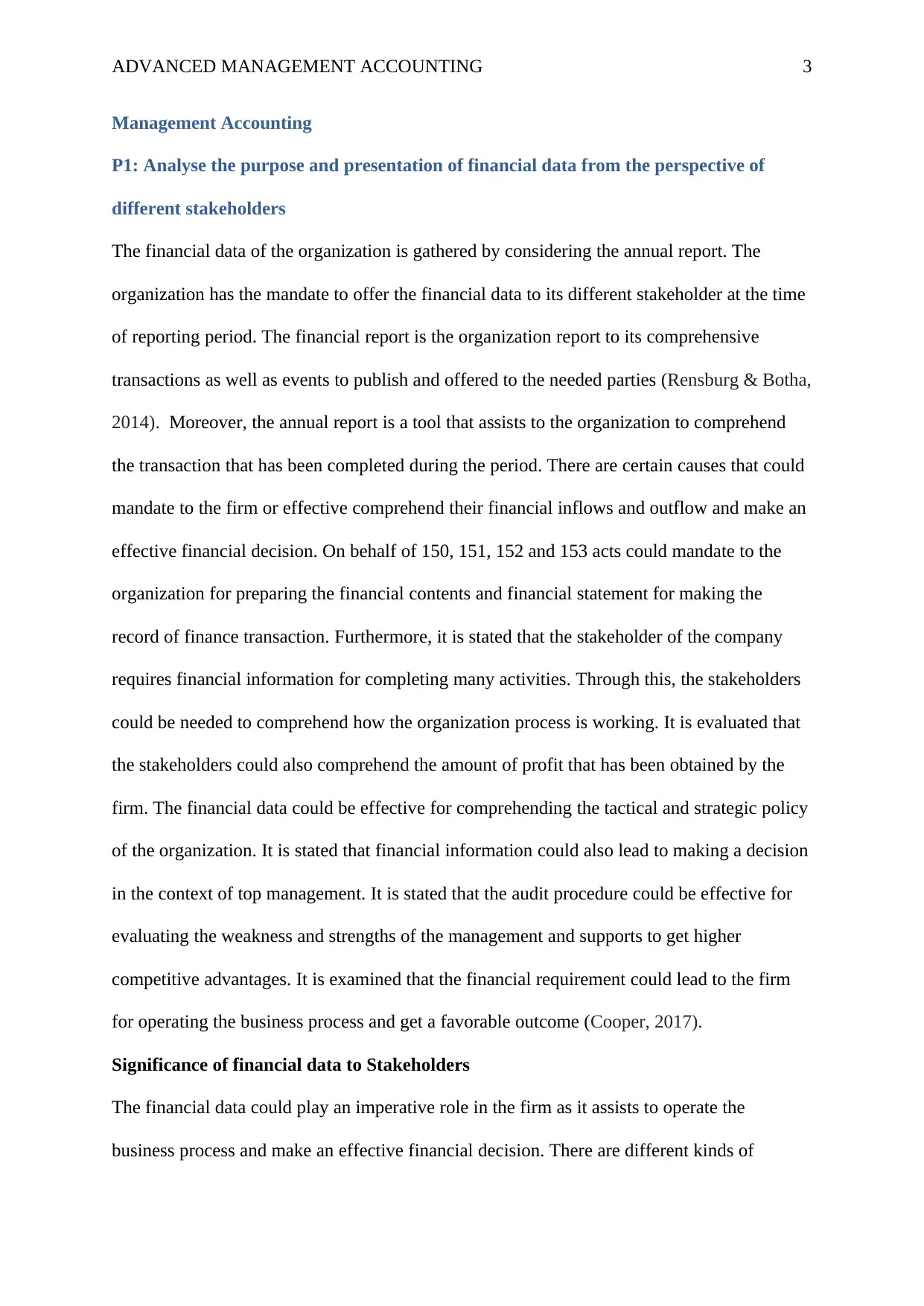
ADVANCED MANAGEMENT ACCOUNTING 3
Management Accounting
P1: Analyse the purpose and presentation of financial data from the perspective of
different stakeholders
The financial data of the organization is gathered by considering the annual report. The
organization has the mandate to offer the financial data to its different stakeholder at the time
of reporting period. The financial report is the organization report to its comprehensive
transactions as well as events to publish and offered to the needed parties (Rensburg & Botha,
2014). Moreover, the annual report is a tool that assists to the organization to comprehend
the transaction that has been completed during the period. There are certain causes that could
mandate to the firm or effective comprehend their financial inflows and outflow and make an
effective financial decision. On behalf of 150, 151, 152 and 153 acts could mandate to the
organization for preparing the financial contents and financial statement for making the
record of finance transaction. Furthermore, it is stated that the stakeholder of the company
requires financial information for completing many activities. Through this, the stakeholders
could be needed to comprehend how the organization process is working. It is evaluated that
the stakeholders could also comprehend the amount of profit that has been obtained by the
firm. The financial data could be effective for comprehending the tactical and strategic policy
of the organization. It is stated that financial information could also lead to making a decision
in the context of top management. It is stated that the audit procedure could be effective for
evaluating the weakness and strengths of the management and supports to get higher
competitive advantages. It is examined that the financial requirement could lead to the firm
for operating the business process and get a favorable outcome (Cooper, 2017).
Significance of financial data to Stakeholders
The financial data could play an imperative role in the firm as it assists to operate the
business process and make an effective financial decision. There are different kinds of
Management Accounting
P1: Analyse the purpose and presentation of financial data from the perspective of
different stakeholders
The financial data of the organization is gathered by considering the annual report. The
organization has the mandate to offer the financial data to its different stakeholder at the time
of reporting period. The financial report is the organization report to its comprehensive
transactions as well as events to publish and offered to the needed parties (Rensburg & Botha,
2014). Moreover, the annual report is a tool that assists to the organization to comprehend
the transaction that has been completed during the period. There are certain causes that could
mandate to the firm or effective comprehend their financial inflows and outflow and make an
effective financial decision. On behalf of 150, 151, 152 and 153 acts could mandate to the
organization for preparing the financial contents and financial statement for making the
record of finance transaction. Furthermore, it is stated that the stakeholder of the company
requires financial information for completing many activities. Through this, the stakeholders
could be needed to comprehend how the organization process is working. It is evaluated that
the stakeholders could also comprehend the amount of profit that has been obtained by the
firm. The financial data could be effective for comprehending the tactical and strategic policy
of the organization. It is stated that financial information could also lead to making a decision
in the context of top management. It is stated that the audit procedure could be effective for
evaluating the weakness and strengths of the management and supports to get higher
competitive advantages. It is examined that the financial requirement could lead to the firm
for operating the business process and get a favorable outcome (Cooper, 2017).
Significance of financial data to Stakeholders
The financial data could play an imperative role in the firm as it assists to operate the
business process and make an effective financial decision. There are different kinds of
⊘ This is a preview!⊘
Do you want full access?
Subscribe today to unlock all pages.

Trusted by 1+ million students worldwide
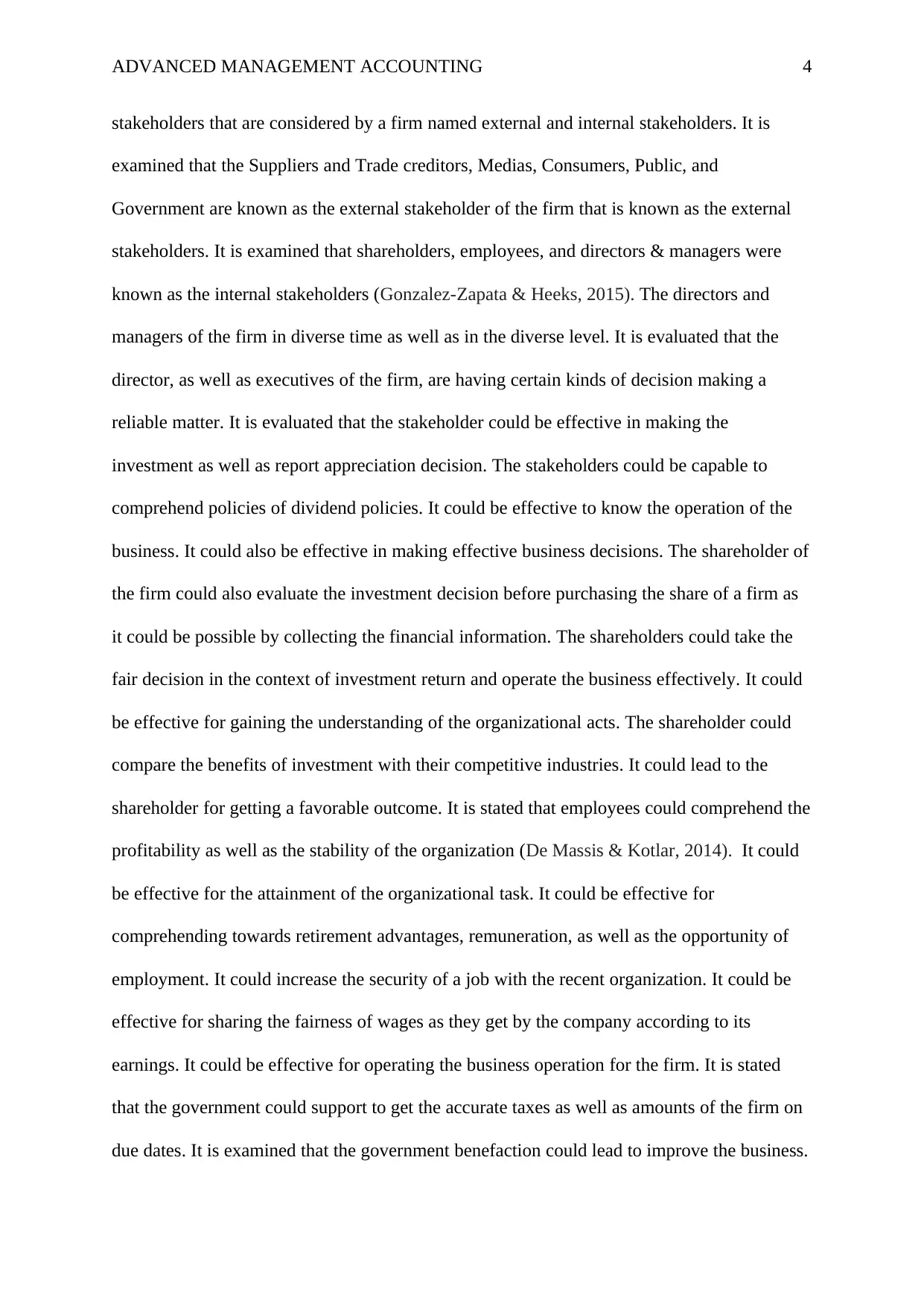
ADVANCED MANAGEMENT ACCOUNTING 4
stakeholders that are considered by a firm named external and internal stakeholders. It is
examined that the Suppliers and Trade creditors, Medias, Consumers, Public, and
Government are known as the external stakeholder of the firm that is known as the external
stakeholders. It is examined that shareholders, employees, and directors & managers were
known as the internal stakeholders (Gonzalez-Zapata & Heeks, 2015). The directors and
managers of the firm in diverse time as well as in the diverse level. It is evaluated that the
director, as well as executives of the firm, are having certain kinds of decision making a
reliable matter. It is evaluated that the stakeholder could be effective in making the
investment as well as report appreciation decision. The stakeholders could be capable to
comprehend policies of dividend policies. It could be effective to know the operation of the
business. It could also be effective in making effective business decisions. The shareholder of
the firm could also evaluate the investment decision before purchasing the share of a firm as
it could be possible by collecting the financial information. The shareholders could take the
fair decision in the context of investment return and operate the business effectively. It could
be effective for gaining the understanding of the organizational acts. The shareholder could
compare the benefits of investment with their competitive industries. It could lead to the
shareholder for getting a favorable outcome. It is stated that employees could comprehend the
profitability as well as the stability of the organization (De Massis & Kotlar, 2014). It could
be effective for the attainment of the organizational task. It could be effective for
comprehending towards retirement advantages, remuneration, as well as the opportunity of
employment. It could increase the security of a job with the recent organization. It could be
effective for sharing the fairness of wages as they get by the company according to its
earnings. It could be effective for operating the business operation for the firm. It is stated
that the government could support to get the accurate taxes as well as amounts of the firm on
due dates. It is examined that the government benefaction could lead to improve the business.
stakeholders that are considered by a firm named external and internal stakeholders. It is
examined that the Suppliers and Trade creditors, Medias, Consumers, Public, and
Government are known as the external stakeholder of the firm that is known as the external
stakeholders. It is examined that shareholders, employees, and directors & managers were
known as the internal stakeholders (Gonzalez-Zapata & Heeks, 2015). The directors and
managers of the firm in diverse time as well as in the diverse level. It is evaluated that the
director, as well as executives of the firm, are having certain kinds of decision making a
reliable matter. It is evaluated that the stakeholder could be effective in making the
investment as well as report appreciation decision. The stakeholders could be capable to
comprehend policies of dividend policies. It could be effective to know the operation of the
business. It could also be effective in making effective business decisions. The shareholder of
the firm could also evaluate the investment decision before purchasing the share of a firm as
it could be possible by collecting the financial information. The shareholders could take the
fair decision in the context of investment return and operate the business effectively. It could
be effective for gaining the understanding of the organizational acts. The shareholder could
compare the benefits of investment with their competitive industries. It could lead to the
shareholder for getting a favorable outcome. It is stated that employees could comprehend the
profitability as well as the stability of the organization (De Massis & Kotlar, 2014). It could
be effective for the attainment of the organizational task. It could be effective for
comprehending towards retirement advantages, remuneration, as well as the opportunity of
employment. It could increase the security of a job with the recent organization. It could be
effective for sharing the fairness of wages as they get by the company according to its
earnings. It could be effective for operating the business operation for the firm. It is stated
that the government could support to get the accurate taxes as well as amounts of the firm on
due dates. It is examined that the government benefaction could lead to improve the business.
Paraphrase This Document
Need a fresh take? Get an instant paraphrase of this document with our AI Paraphraser
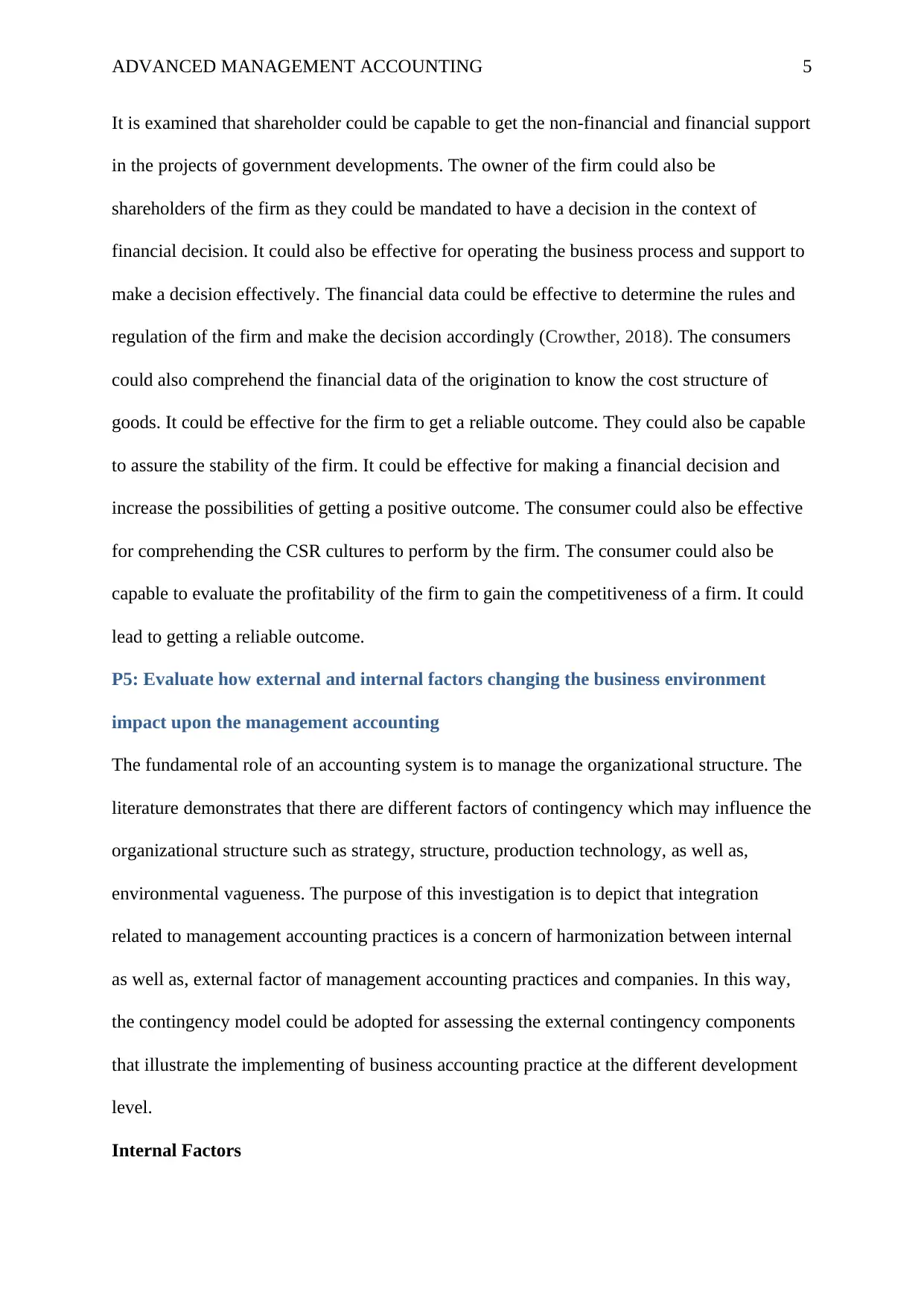
ADVANCED MANAGEMENT ACCOUNTING 5
It is examined that shareholder could be capable to get the non-financial and financial support
in the projects of government developments. The owner of the firm could also be
shareholders of the firm as they could be mandated to have a decision in the context of
financial decision. It could also be effective for operating the business process and support to
make a decision effectively. The financial data could be effective to determine the rules and
regulation of the firm and make the decision accordingly (Crowther, 2018). The consumers
could also comprehend the financial data of the origination to know the cost structure of
goods. It could be effective for the firm to get a reliable outcome. They could also be capable
to assure the stability of the firm. It could be effective for making a financial decision and
increase the possibilities of getting a positive outcome. The consumer could also be effective
for comprehending the CSR cultures to perform by the firm. The consumer could also be
capable to evaluate the profitability of the firm to gain the competitiveness of a firm. It could
lead to getting a reliable outcome.
P5: Evaluate how external and internal factors changing the business environment
impact upon the management accounting
The fundamental role of an accounting system is to manage the organizational structure. The
literature demonstrates that there are different factors of contingency which may influence the
organizational structure such as strategy, structure, production technology, as well as,
environmental vagueness. The purpose of this investigation is to depict that integration
related to management accounting practices is a concern of harmonization between internal
as well as, external factor of management accounting practices and companies. In this way,
the contingency model could be adopted for assessing the external contingency components
that illustrate the implementing of business accounting practice at the different development
level.
Internal Factors
It is examined that shareholder could be capable to get the non-financial and financial support
in the projects of government developments. The owner of the firm could also be
shareholders of the firm as they could be mandated to have a decision in the context of
financial decision. It could also be effective for operating the business process and support to
make a decision effectively. The financial data could be effective to determine the rules and
regulation of the firm and make the decision accordingly (Crowther, 2018). The consumers
could also comprehend the financial data of the origination to know the cost structure of
goods. It could be effective for the firm to get a reliable outcome. They could also be capable
to assure the stability of the firm. It could be effective for making a financial decision and
increase the possibilities of getting a positive outcome. The consumer could also be effective
for comprehending the CSR cultures to perform by the firm. The consumer could also be
capable to evaluate the profitability of the firm to gain the competitiveness of a firm. It could
lead to getting a reliable outcome.
P5: Evaluate how external and internal factors changing the business environment
impact upon the management accounting
The fundamental role of an accounting system is to manage the organizational structure. The
literature demonstrates that there are different factors of contingency which may influence the
organizational structure such as strategy, structure, production technology, as well as,
environmental vagueness. The purpose of this investigation is to depict that integration
related to management accounting practices is a concern of harmonization between internal
as well as, external factor of management accounting practices and companies. In this way,
the contingency model could be adopted for assessing the external contingency components
that illustrate the implementing of business accounting practice at the different development
level.
Internal Factors
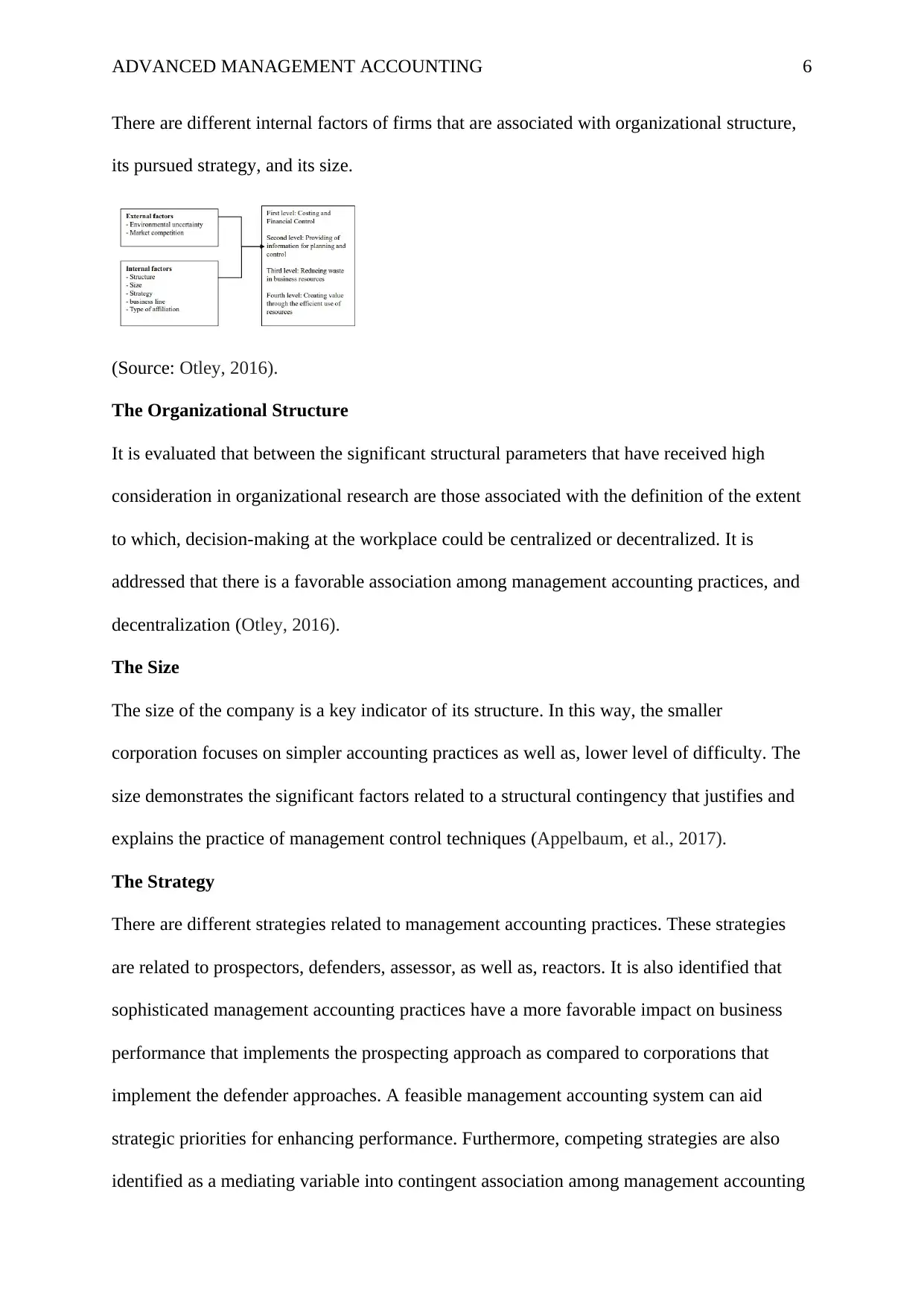
ADVANCED MANAGEMENT ACCOUNTING 6
There are different internal factors of firms that are associated with organizational structure,
its pursued strategy, and its size.
(Source: Otley, 2016).
The Organizational Structure
It is evaluated that between the significant structural parameters that have received high
consideration in organizational research are those associated with the definition of the extent
to which, decision-making at the workplace could be centralized or decentralized. It is
addressed that there is a favorable association among management accounting practices, and
decentralization (Otley, 2016).
The Size
The size of the company is a key indicator of its structure. In this way, the smaller
corporation focuses on simpler accounting practices as well as, lower level of difficulty. The
size demonstrates the significant factors related to a structural contingency that justifies and
explains the practice of management control techniques (Appelbaum, et al., 2017).
The Strategy
There are different strategies related to management accounting practices. These strategies
are related to prospectors, defenders, assessor, as well as, reactors. It is also identified that
sophisticated management accounting practices have a more favorable impact on business
performance that implements the prospecting approach as compared to corporations that
implement the defender approaches. A feasible management accounting system can aid
strategic priorities for enhancing performance. Furthermore, competing strategies are also
identified as a mediating variable into contingent association among management accounting
There are different internal factors of firms that are associated with organizational structure,
its pursued strategy, and its size.
(Source: Otley, 2016).
The Organizational Structure
It is evaluated that between the significant structural parameters that have received high
consideration in organizational research are those associated with the definition of the extent
to which, decision-making at the workplace could be centralized or decentralized. It is
addressed that there is a favorable association among management accounting practices, and
decentralization (Otley, 2016).
The Size
The size of the company is a key indicator of its structure. In this way, the smaller
corporation focuses on simpler accounting practices as well as, lower level of difficulty. The
size demonstrates the significant factors related to a structural contingency that justifies and
explains the practice of management control techniques (Appelbaum, et al., 2017).
The Strategy
There are different strategies related to management accounting practices. These strategies
are related to prospectors, defenders, assessor, as well as, reactors. It is also identified that
sophisticated management accounting practices have a more favorable impact on business
performance that implements the prospecting approach as compared to corporations that
implement the defender approaches. A feasible management accounting system can aid
strategic priorities for enhancing performance. Furthermore, competing strategies are also
identified as a mediating variable into contingent association among management accounting
⊘ This is a preview!⊘
Do you want full access?
Subscribe today to unlock all pages.

Trusted by 1+ million students worldwide
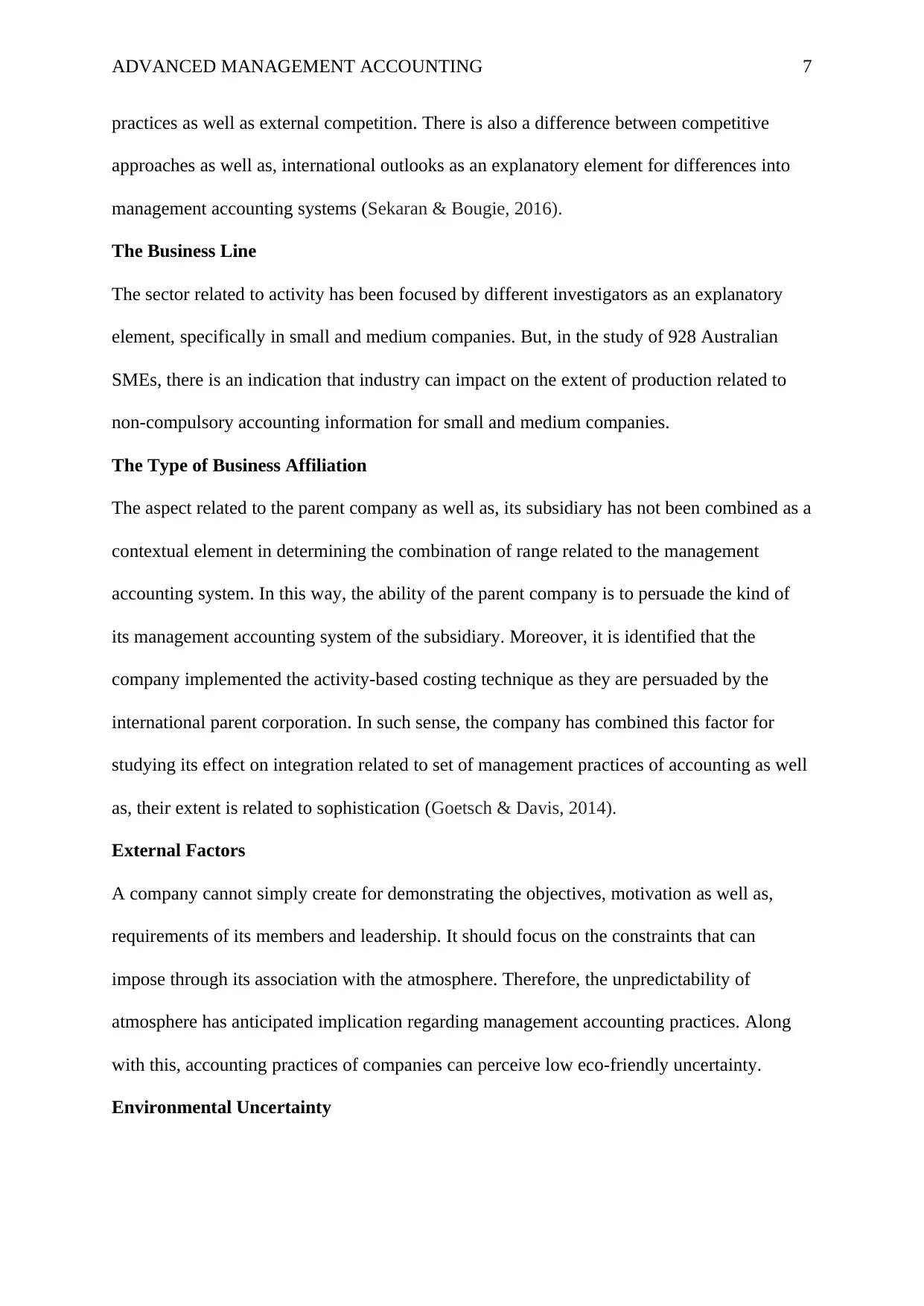
ADVANCED MANAGEMENT ACCOUNTING 7
practices as well as external competition. There is also a difference between competitive
approaches as well as, international outlooks as an explanatory element for differences into
management accounting systems (Sekaran & Bougie, 2016).
The Business Line
The sector related to activity has been focused by different investigators as an explanatory
element, specifically in small and medium companies. But, in the study of 928 Australian
SMEs, there is an indication that industry can impact on the extent of production related to
non-compulsory accounting information for small and medium companies.
The Type of Business Affiliation
The aspect related to the parent company as well as, its subsidiary has not been combined as a
contextual element in determining the combination of range related to the management
accounting system. In this way, the ability of the parent company is to persuade the kind of
its management accounting system of the subsidiary. Moreover, it is identified that the
company implemented the activity-based costing technique as they are persuaded by the
international parent corporation. In such sense, the company has combined this factor for
studying its effect on integration related to set of management practices of accounting as well
as, their extent is related to sophistication (Goetsch & Davis, 2014).
External Factors
A company cannot simply create for demonstrating the objectives, motivation as well as,
requirements of its members and leadership. It should focus on the constraints that can
impose through its association with the atmosphere. Therefore, the unpredictability of
atmosphere has anticipated implication regarding management accounting practices. Along
with this, accounting practices of companies can perceive low eco-friendly uncertainty.
Environmental Uncertainty
practices as well as external competition. There is also a difference between competitive
approaches as well as, international outlooks as an explanatory element for differences into
management accounting systems (Sekaran & Bougie, 2016).
The Business Line
The sector related to activity has been focused by different investigators as an explanatory
element, specifically in small and medium companies. But, in the study of 928 Australian
SMEs, there is an indication that industry can impact on the extent of production related to
non-compulsory accounting information for small and medium companies.
The Type of Business Affiliation
The aspect related to the parent company as well as, its subsidiary has not been combined as a
contextual element in determining the combination of range related to the management
accounting system. In this way, the ability of the parent company is to persuade the kind of
its management accounting system of the subsidiary. Moreover, it is identified that the
company implemented the activity-based costing technique as they are persuaded by the
international parent corporation. In such sense, the company has combined this factor for
studying its effect on integration related to set of management practices of accounting as well
as, their extent is related to sophistication (Goetsch & Davis, 2014).
External Factors
A company cannot simply create for demonstrating the objectives, motivation as well as,
requirements of its members and leadership. It should focus on the constraints that can
impose through its association with the atmosphere. Therefore, the unpredictability of
atmosphere has anticipated implication regarding management accounting practices. Along
with this, accounting practices of companies can perceive low eco-friendly uncertainty.
Environmental Uncertainty
Paraphrase This Document
Need a fresh take? Get an instant paraphrase of this document with our AI Paraphraser
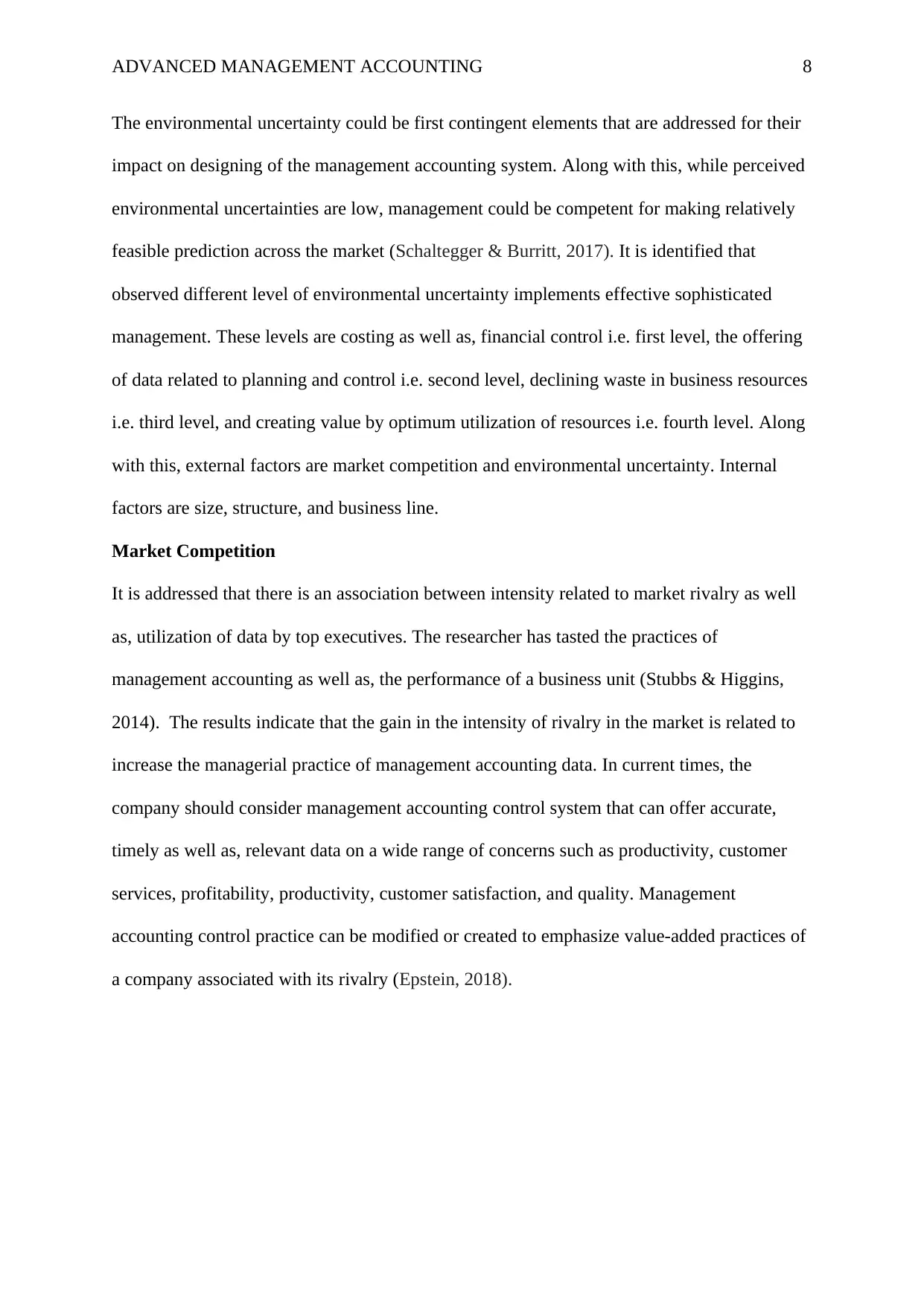
ADVANCED MANAGEMENT ACCOUNTING 8
The environmental uncertainty could be first contingent elements that are addressed for their
impact on designing of the management accounting system. Along with this, while perceived
environmental uncertainties are low, management could be competent for making relatively
feasible prediction across the market (Schaltegger & Burritt, 2017). It is identified that
observed different level of environmental uncertainty implements effective sophisticated
management. These levels are costing as well as, financial control i.e. first level, the offering
of data related to planning and control i.e. second level, declining waste in business resources
i.e. third level, and creating value by optimum utilization of resources i.e. fourth level. Along
with this, external factors are market competition and environmental uncertainty. Internal
factors are size, structure, and business line.
Market Competition
It is addressed that there is an association between intensity related to market rivalry as well
as, utilization of data by top executives. The researcher has tasted the practices of
management accounting as well as, the performance of a business unit (Stubbs & Higgins,
2014). The results indicate that the gain in the intensity of rivalry in the market is related to
increase the managerial practice of management accounting data. In current times, the
company should consider management accounting control system that can offer accurate,
timely as well as, relevant data on a wide range of concerns such as productivity, customer
services, profitability, productivity, customer satisfaction, and quality. Management
accounting control practice can be modified or created to emphasize value-added practices of
a company associated with its rivalry (Epstein, 2018).
The environmental uncertainty could be first contingent elements that are addressed for their
impact on designing of the management accounting system. Along with this, while perceived
environmental uncertainties are low, management could be competent for making relatively
feasible prediction across the market (Schaltegger & Burritt, 2017). It is identified that
observed different level of environmental uncertainty implements effective sophisticated
management. These levels are costing as well as, financial control i.e. first level, the offering
of data related to planning and control i.e. second level, declining waste in business resources
i.e. third level, and creating value by optimum utilization of resources i.e. fourth level. Along
with this, external factors are market competition and environmental uncertainty. Internal
factors are size, structure, and business line.
Market Competition
It is addressed that there is an association between intensity related to market rivalry as well
as, utilization of data by top executives. The researcher has tasted the practices of
management accounting as well as, the performance of a business unit (Stubbs & Higgins,
2014). The results indicate that the gain in the intensity of rivalry in the market is related to
increase the managerial practice of management accounting data. In current times, the
company should consider management accounting control system that can offer accurate,
timely as well as, relevant data on a wide range of concerns such as productivity, customer
services, profitability, productivity, customer satisfaction, and quality. Management
accounting control practice can be modified or created to emphasize value-added practices of
a company associated with its rivalry (Epstein, 2018).
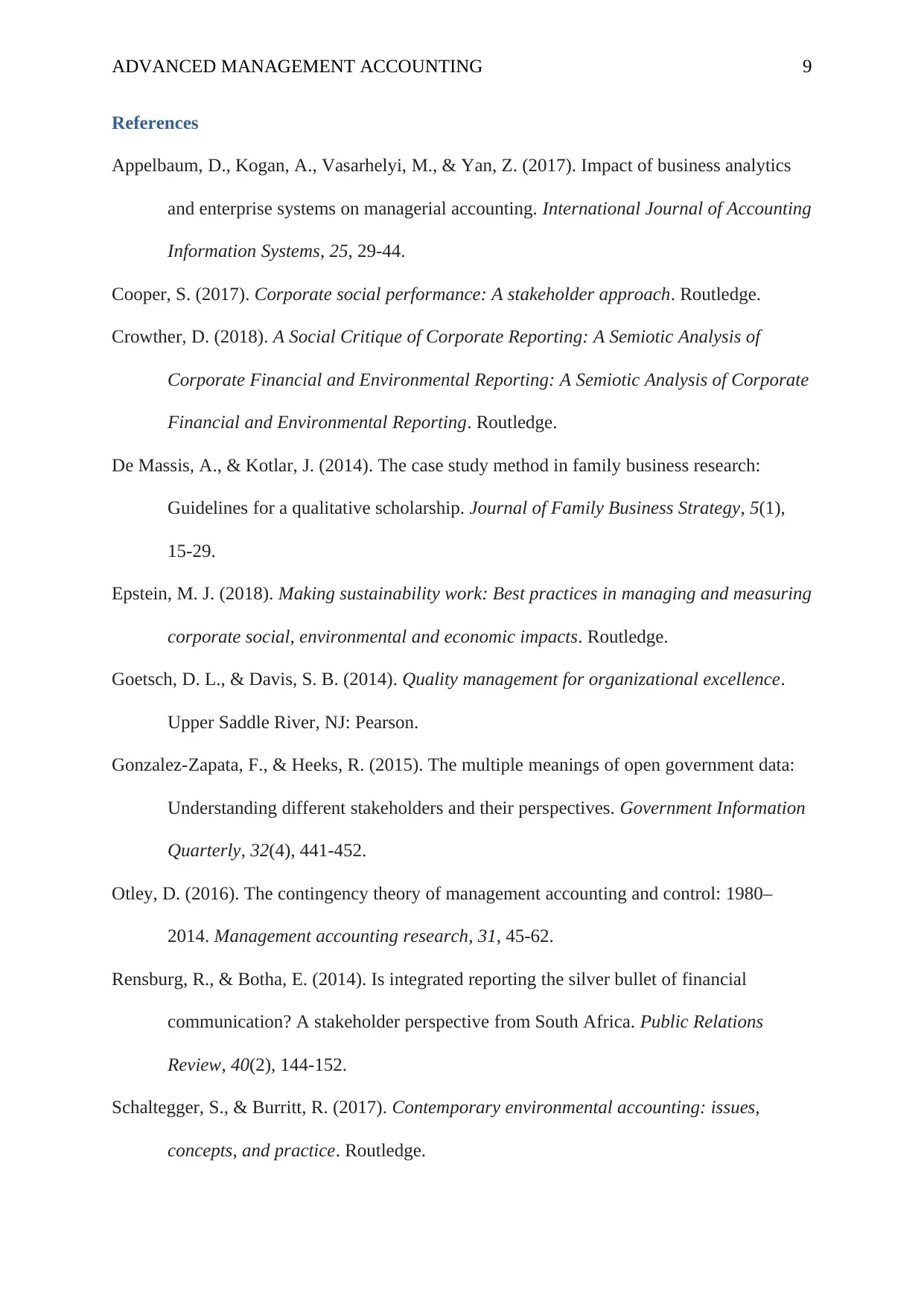
ADVANCED MANAGEMENT ACCOUNTING 9
References
Appelbaum, D., Kogan, A., Vasarhelyi, M., & Yan, Z. (2017). Impact of business analytics
and enterprise systems on managerial accounting. International Journal of Accounting
Information Systems, 25, 29-44.
Cooper, S. (2017). Corporate social performance: A stakeholder approach. Routledge.
Crowther, D. (2018). A Social Critique of Corporate Reporting: A Semiotic Analysis of
Corporate Financial and Environmental Reporting: A Semiotic Analysis of Corporate
Financial and Environmental Reporting. Routledge.
De Massis, A., & Kotlar, J. (2014). The case study method in family business research:
Guidelines for a qualitative scholarship. Journal of Family Business Strategy, 5(1),
15-29.
Epstein, M. J. (2018). Making sustainability work: Best practices in managing and measuring
corporate social, environmental and economic impacts. Routledge.
Goetsch, D. L., & Davis, S. B. (2014). Quality management for organizational excellence.
Upper Saddle River, NJ: Pearson.
Gonzalez-Zapata, F., & Heeks, R. (2015). The multiple meanings of open government data:
Understanding different stakeholders and their perspectives. Government Information
Quarterly, 32(4), 441-452.
Otley, D. (2016). The contingency theory of management accounting and control: 1980–
2014. Management accounting research, 31, 45-62.
Rensburg, R., & Botha, E. (2014). Is integrated reporting the silver bullet of financial
communication? A stakeholder perspective from South Africa. Public Relations
Review, 40(2), 144-152.
Schaltegger, S., & Burritt, R. (2017). Contemporary environmental accounting: issues,
concepts, and practice. Routledge.
References
Appelbaum, D., Kogan, A., Vasarhelyi, M., & Yan, Z. (2017). Impact of business analytics
and enterprise systems on managerial accounting. International Journal of Accounting
Information Systems, 25, 29-44.
Cooper, S. (2017). Corporate social performance: A stakeholder approach. Routledge.
Crowther, D. (2018). A Social Critique of Corporate Reporting: A Semiotic Analysis of
Corporate Financial and Environmental Reporting: A Semiotic Analysis of Corporate
Financial and Environmental Reporting. Routledge.
De Massis, A., & Kotlar, J. (2014). The case study method in family business research:
Guidelines for a qualitative scholarship. Journal of Family Business Strategy, 5(1),
15-29.
Epstein, M. J. (2018). Making sustainability work: Best practices in managing and measuring
corporate social, environmental and economic impacts. Routledge.
Goetsch, D. L., & Davis, S. B. (2014). Quality management for organizational excellence.
Upper Saddle River, NJ: Pearson.
Gonzalez-Zapata, F., & Heeks, R. (2015). The multiple meanings of open government data:
Understanding different stakeholders and their perspectives. Government Information
Quarterly, 32(4), 441-452.
Otley, D. (2016). The contingency theory of management accounting and control: 1980–
2014. Management accounting research, 31, 45-62.
Rensburg, R., & Botha, E. (2014). Is integrated reporting the silver bullet of financial
communication? A stakeholder perspective from South Africa. Public Relations
Review, 40(2), 144-152.
Schaltegger, S., & Burritt, R. (2017). Contemporary environmental accounting: issues,
concepts, and practice. Routledge.
⊘ This is a preview!⊘
Do you want full access?
Subscribe today to unlock all pages.

Trusted by 1+ million students worldwide
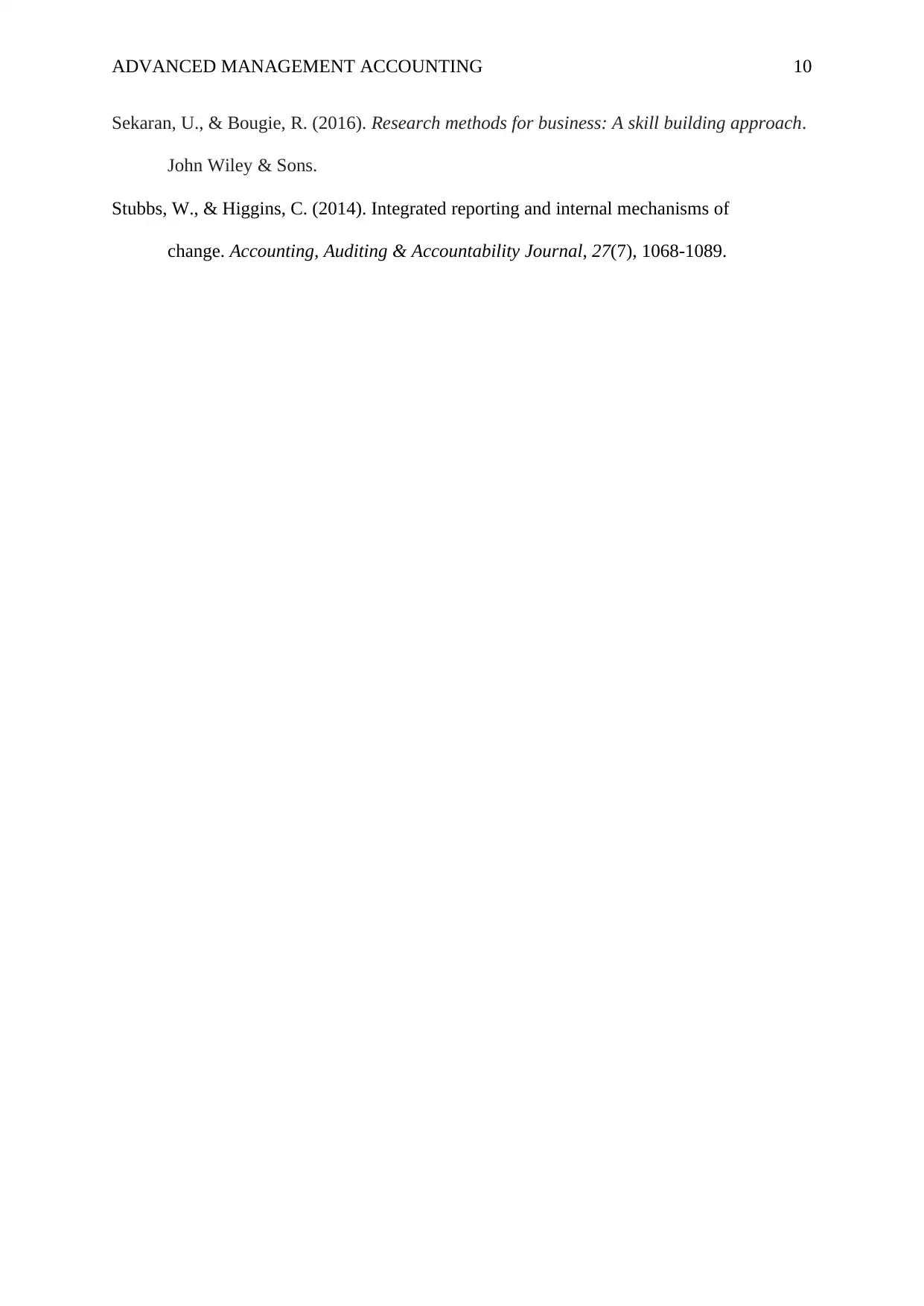
ADVANCED MANAGEMENT ACCOUNTING 10
Sekaran, U., & Bougie, R. (2016). Research methods for business: A skill building approach.
John Wiley & Sons.
Stubbs, W., & Higgins, C. (2014). Integrated reporting and internal mechanisms of
change. Accounting, Auditing & Accountability Journal, 27(7), 1068-1089.
Sekaran, U., & Bougie, R. (2016). Research methods for business: A skill building approach.
John Wiley & Sons.
Stubbs, W., & Higgins, C. (2014). Integrated reporting and internal mechanisms of
change. Accounting, Auditing & Accountability Journal, 27(7), 1068-1089.
1 out of 10
Related Documents
Your All-in-One AI-Powered Toolkit for Academic Success.
+13062052269
info@desklib.com
Available 24*7 on WhatsApp / Email
![[object Object]](/_next/static/media/star-bottom.7253800d.svg)
Unlock your academic potential
Copyright © 2020–2026 A2Z Services. All Rights Reserved. Developed and managed by ZUCOL.





